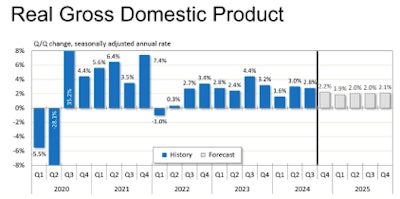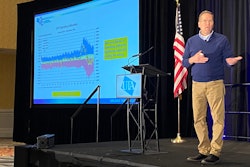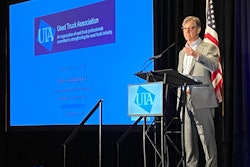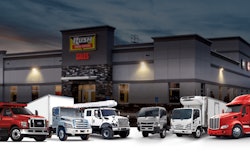
While many parts of the economy have settled into near-normal, pre-pandemic levels, there is considerable uncertainty in the future, FTR Transportation Intelligence says.
In a webinar on Thursday, FTR CEO Jonathan Starks, FTR Vice President Avery Vise and economist Bill Witte detailed key economic indicators and the outlook for 2025, including the considerable uncertainty surrounding the U.S. economy and policy.
[RELATED: UTA speaker says inflation could return in force in 2025]
Vise kicked off the webinar with a look at leading economic indicators, outlining a slight downward trend in manufacturing output and showing stability in consumer spending, inventory-to-sales ratios, real gross domestic product (GDP) and prices. However, Vise and Witte both warned that consumption levels can't stay where they are.
"Consumption has been outstripping income growth," Witte says. "You can't do that forever."
The panel says a slowdown has to be coming for 2025, but nothing like an economy that's collapsing or going into a recession. Witte says household consumption is divided. Services have been stronger, but they're almost the sole province of upscale, higher-income households. Lower-income households consumer more goods, typically, and they're having more difficulty.
"What it means is that we might have an economy is that the overall macro story looks pretty good, but for a lot of the people out there, it's not going to be that good, and that's a dangerous situation," Witte says.
[RELATED: Fed cuts interest rates by a quarter point]
Vise says most carriers seem to think the worst is behind them and don't realize they're facing potential downward pressure from a contraction in household consumption.
"We might be viewing a consumer side more positively than we need to be," Vise says. That said, job openings in general have normalized, more or less, Vise says, and that includes in transportation. Businesses in the sector want to keep their options flexible.
"I think it has kept them conservative in terms of not wanting to add or reduce their payrolls," he says. "We don't want either large gains or large decreases in our capacity."
There's not been any improvement on the global stage, either. Witte and Vise outlined plenty of pressure from global hotspots such as the Middle East, Ukraine and China, where "nothing has gotten better." Furthermore, Witte says, there's U.S. government deficit spending. Some of President-elect Donald J. Trump's promised policies come with big price tags.
Take immigration. First up, Witte says when it comes to restocking the U.S. labor market, the numbers don't add up. There aren't enough new Americans filling the ranks of retirees, he says, and immigrants are key to filling jobs. Any slowdown in immigration could put pressure on trucking businesses looking to add or replace employees.
"We have to have at least some component that's immigrant related," he says.
If federal policies really do shut down immigration across the southern border without replacing it with legal immigration, Witte says it would be a negative force on the economy. Then there's the promise Trump made on the campaign trail of mass deportations. Even the threat of large-scale deportation would be disruptive, he says, pointing out that many undocumented immigrants are established members of American society, plus, it would be extremely expensive to implement.
Federal deficits are another problem, one that will be exacerbated by the almost-certain extension of the 2017 Trump tax cuts. While it will be an overall positive move for business, Witte says the extension basically takes money the government was counting on away, adding to Washington's debt. Trump also promised other tax cuts, specifically to income from tips, overtime and Social Security.
"They are arbitrary, specific tax cuts. Good tax policy should be based on broad bases and even treatment on everybody," Witte says. And he says the Social Security cut would not only cost the most but move the timeline for the collapse of the system up by two or three years, adding his grandfather wrote the Social Security Act in 1935.
"I have a familial attachment to the system and I hate to see it screwed up," Witte says. "Right now, it's sort of screwed up."
While Vise says he expects the EPA greenhouse gas rule and other emissions regulations are "esstentially dead," and Witte agrees, the economist also warns people to be conservative when it comes to their expectations for a new Trump administration.
"You have to be careful," Witte warns. "Think about what Trump wants to do and what he will be able to do."
This means while some federal emissions regulations and other policies that affect transportation may change, state regulations may not or may even get stronger. In California, Witte points out, the governor has already called the Legislature back into session to prepare to counteract any changes to federal policies.
"There's going to be a huge battle between California and the Trump administration," Vise says.
Witte agrees, saying any Trump proposals will almost certainly be met with litigation.
"All of this is going to create a lot of work for lawyers," Witte says.










